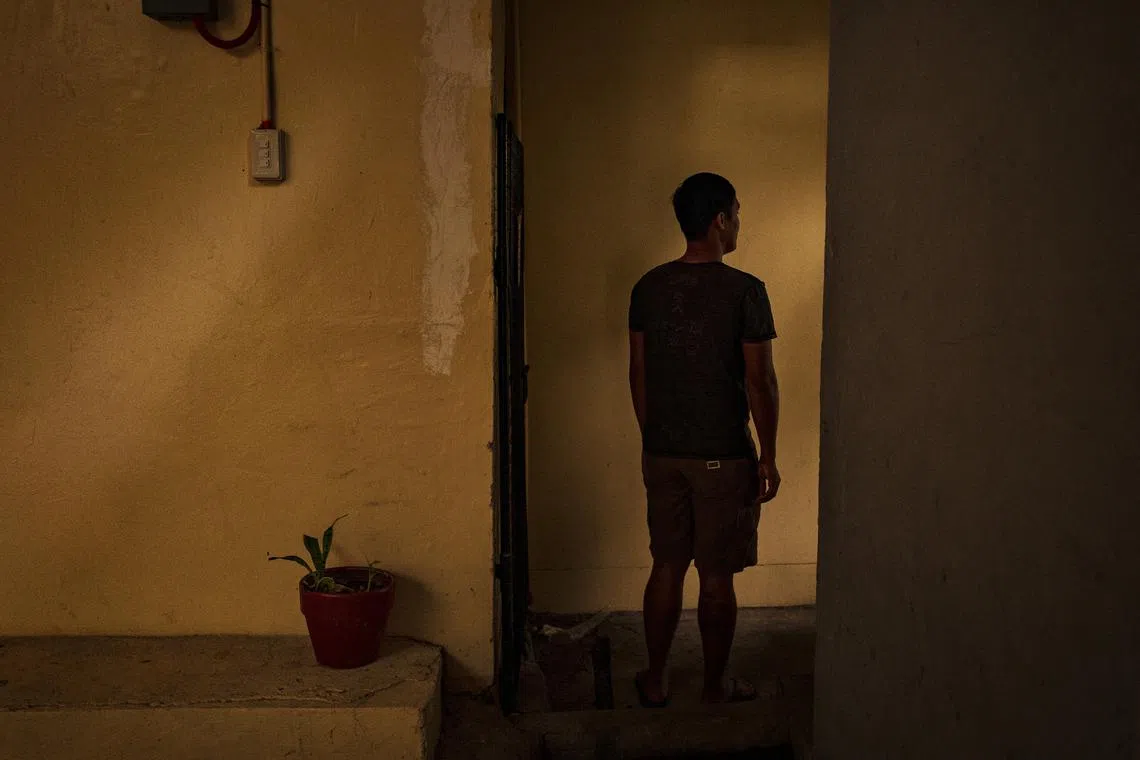Law enforcement needs better digital game to stop cyber scammers: Mekong region report
Sign up now: Get ST's newsletters delivered to your inbox

Transnational criminal organisations have trafficked people from over 30 countries into online-facilitated human trafficking compounds.
PHOTO: NYTIMES
WASHINGTON – If you receive a text from an unknown number asking if you would like to go to dinner, and flag it as a scammer trying to deceive you, it is quite possible that the person sending the text is a victim too.
The Mekong region, especially Myanmar, Laos and Cambodia, is the epicentre of cyber-enabled crime run by syndicates that lure often educated, English-speaking job seekers from across Asia and beyond, trap them in compounds and force them to operate various digital scams.
A report released on Thursday in Washington highlights how, in an industry lubricated by corruption, transnational criminal organisations have trafficked people from more than 30 countries into online-facilitated human trafficking compounds in Cambodia, Laos, Myanmar and the Philippines.
“Technology and criminal ingenuity are moving faster than the legal landscape and mandate for law enforcement agencies and, as a result, the explosion of cyber-enabled crimes has not been met by increasing resources and capacity building for law enforcement agencies,” warned the report that emerged from the Mekong-US Partnership Track 1.5 Policy Dialogue on Trafficking and Cyber-Enabled Crime.
The report is based on the sixth conference under the US-supported dialogue held in the Thai capital of Bangkok from May 8 to 9, 2023.
The conference featured 78 experts and community representatives from across the region and focused on the challenges of non-traditional security threats, particularly cyber-enabled crimes and trafficking in persons, wildlife, narcotics and other illicit goods.
It is the latest in a growing body of research on the issue, including a United Nations High Commissioner for Human Rights report on Aug 29, and an International Crisis Group report on Aug 28 – which concluded that “Myanmar’s Shan state and northern Laos’ Bokeo province have become a contiguous zone of vibrant criminality, much of it beyond the reach of state authorities”.
The Track 1.5 report concludes that while online fraud is not new, the phenomenon of cyber-enabled crime where victims are enslaved and forced to commit cyber crime is a new trend – and the response is not up to par.
“Law enforcement agencies often see victims in these scam compounds as criminals and charge them with crimes,” the report said.
“Forced criminality principles – that victims should not be charged for crimes they were forced to commit – are not widely known or applied in these instances even when clearly applicable.
“Regional governments should work to share intelligence by signing legally binding MOUs, encouraging police-to-police collaboration, and establishing dedicated contact points such as nominated officers for key agencies,” it added.
Speaking on Thursday at the online launch of the report, Ms Nga Bui, senior programme officer in Hanoi with Traffic, noted that corruption is a critical factor enabling the criminal networks. Traffic is a non-governmental organisation monitoring illegal wildlife trade, an aspect that is also covered in the report.
“Addressing the corruption-trafficking nexus has a long way to go,” she said.
Criminal networks have taken advantage of the open, globalised economic system, said Ms Cynthia Gabriel, founding director of the Centre to Combat Corruption and Cronyism in Malaysia.
“I think the first thing that we should talk about... is how we can actually strengthen law enforcement in the Mekong region, (which is) definitely very vulnerable because we’re talking about many countries... that actually have a weak rule of law,” she added.
“There are weak checks and balances and weak systems. This is where corruption festers – and one of the main areas that we need to look at, apart from political will, is how do we actually get law enforcement to work better for our interests.”
Ms Valentina Casulli of Britain-based Humanity Research Consultancy (HRC), which has helped 70 victims escape criminal enterprises, noted that victims are lured to compounds across South-east Asia, commonly in Cambodia, Myanmar, Laos and the Philippines. They are given mobile phones and forced to make scam calls across the globe.
They cannot leave unless they pay large sums of money – which they do not have – and if they do not perform well or refuse to comply, they are beaten and tortured, said the project officer.
“We have identified victims for over 20 different countries since first discovering this crime,” she added. “This includes countries such as Peru, Uganda, China and Russia. And this is ever evolving.”
Some victims do initially agree to voluntarily conduct the scams, but once there, they face the same level of abuse and torture as the others forced to carry out the scams, she said.
Victims are also sold to and bought by different organisations, Ms Casulli added, with transactions in untraceable digital currencies.
“Technical literacy and capacity in digital forensics need to increase if we are to effectively collect digital evidence... and also trace financial flows,” she said.
Ms Casulli added that HRC has so far identified more than 15 criminals operating compounds in Cambodia, many of whom are “known criminals wanted for their involvement in money laundering, or drug trafficking, illegal gambling”.
Many of the kingpins of these criminal networks enjoy luxurious lifestyles in other countries such as Australia and the United States, she said.
There has been a slight improvement in the record of arrests and prosecutions, Ms Casulli told The Straits Times.
“Taiwan has been particularly proactive,” she said. “Towards the end of last year, they prosecuted close to 300 traffickers that were operating in Taiwan and sending people to the compounds in Cambodia.”
In July 2022, Thai police arrested Chinese national Zhou Dawei, who is wanted in China for smuggling people across borders to work at scam call centres in Laos and Cambodia, at Bangkok’s Suvarnabhumi Airport. He was questioned and reportedly admitted to smuggling Chinese nationals, and was deported to China.
Singapore police in simultaneous raids last month arrested 10 people, some of whom are suspected of laundering proceeds from “overseas organised-crime activities including scams and online gambling”. Those arrested are from China, Turkey, Cambodia, Cyprus and Vanuatu, the police said.
HRC is also aware of “a criminal (who) operates businesses in Australia, and has houses (and) is suspected by the Australian police of involvement in drug trafficking, but they don’t have the adequate evidence to actually prosecute”, Ms Casulli said.
She told ST: “I think that’s a question that we all want to know the answer to – how are these criminals able to live so freely?”




